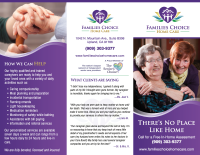
Long-term care plans are essential for seniors and their families, especially those who prefer to age in place.
While the cost of in-home care is notably more affordable than residential options, the financial responsibilities typically increase over time as health-related declines create a need for additional caregiving shifts.
Average Cost of In-Home Care for Seniors in the Inland Empire
Homecare costs vary due to a variety of factors, some of which include:
- The region where you live
- Quality of caregiver education, training, and experience
- Care hours required (i.e., respite care, part-time, overnight, full-time, or live-in shifts)
- Economic fluctuations
How Much Does Private Home Care Cost?
According to Genworth’s report on the cost of long-term care, the 2022 projected monthly costs in the following categories are:
- Home Health Aide: $5,302
- Assisted Living Facility: $4,635*
- Nursing Home (semi-private room): $8,145
- Nursing Home (private room): $9,305
*Assisted living costs are calculated using the facilities’ base monthly fee. They do not reflect additional services that come with extra (often hidden) fees attached, such as laundry/linen services, mobility assistance, personal care, incontinence care, meal delivery to the room, transportation services, and support needed due to residents’ increased care needs.
Unfortunately, as a result of housing pricing and staffing shortages (more on that below), costs continue to increase with each passing year.
Factors Affecting Total Long-Term In-Home Care Costs
There are a variety of factors affecting rising costs in senior in-home care.
1. Where You Live
Not surprisingly, the costs of live-in home care, especially agency-based care, are directly linked to where the clients live. In areas with increased costs of living, such as Los Angeles and the Inland Empire, home care costs are higher than in areas of the country with a lower cost of living, such as the deep south.
2. Quality of Education, Training, and Caregiving Skills
The higher the quality of care, the more expensive it will be. Reputable, professional senior home care agencies invest in their employees to provide platinum-level care and compensate them accordingly. If you notice a notable difference in quotes, feel free to ask why.
There are essential things to look for and verify when searching for a home care provider:
- Licensure with the state
- Thorough hiring practices, including complete DMV and criminal background record checks
- Employees with a high-school education or equivalent, plus fluent verbal communication, reading, and writing skills
- Continuing education and training for employees
- Fair employee compensation, including livable wages, paid time off, and health insurance
- A team-centric approach to client care, with rotating caregiver shifts, so that employees work fair, legal hours
- Memory care training/specialization, which is a must-have when clients have Alzheimer’s or dementia-related diagnoses
Independent caregivers may be “more affordable” at first glance. However, that also means they’re not getting paid time off or benefits. An independent caregiver has no back-up when running late, feeling unwell, or in the middle of a family emergency.
In contrast, our agency’s team-centric approach means a refreshed, experienced, and trained caregiver shows up on time for each and every shift. Period.
3. Caregiving Hours Required
We charge clients at a flat hourly rate rather than by the number or types of services requested. This is one of the main reasons home care services cost dramatically less than assisted living or nursing home facilities. Services are typically charged at a four-hour minimum requirement (ensuring our caregivers maintain sufficient and predictable schedules).
Regardless of whether the caregiver serves as a companion, driver, or meal provider, the hourly fees are the same. Whether you need to add housekeeping, laundry/linen changes, or personal care services—the hourly fees stay the same. Should our caregivers provide toileting or incontinence care, medication reminders, or mobility support, the hourly fees are still set.
This is the opposite of almost any residential option, where services outside of basic housing, group meals, and an internal activities calendar come with an additional fee.
4. Economic Fluctuations, Staff Shortages, and Rising Demand
Economic fluctuations are the fourth and least predictable factor in the senior in-home care costs equation. For example, since the pandemic began, employers around the nation have experienced critical staff shortages. This is one reason the cost of private home care has gone up.
As this CNBC exclusive points out, “Long-term care expenses are growing, with sizable hikes for home-based services as the industry struggles to meet soaring demand from aging Americans.” Yet, even with these rising costs, private home care continues to be significantly more affordable than residential or facility-based care when performing an itemized comparison of costs per individual service.
A Personal Assessment Is the First Step
Fortunately, there are various ways seniors and families can work together to pay for private in-home care services. Scheduling an assessment is the first step in determining the services and shifts best suited to the client’s needs. During the assessment, we also provide additional information and helpful resources for aging in place safely, securely, and with optimal quality of life.
This includes information like:
- Simple DIY changes to make the home safer and more accessible
- Recommendations for more permanent accessible additions (like grab bars, non-slip mats, ramps, motion-sensitive lighting, etc.)
- Nutrition and lifestyle changes to improve quality of life and slow the progression of memory loss or medical conditions.
We’ll also provide a long-term care plan including which services may be required in a graduated fashion over time.
The team at Families Choice Home Care is here to support you as you create a quality long-term care plan for your senior loved one. Contact our office to request a free, no-obligation assessment.





